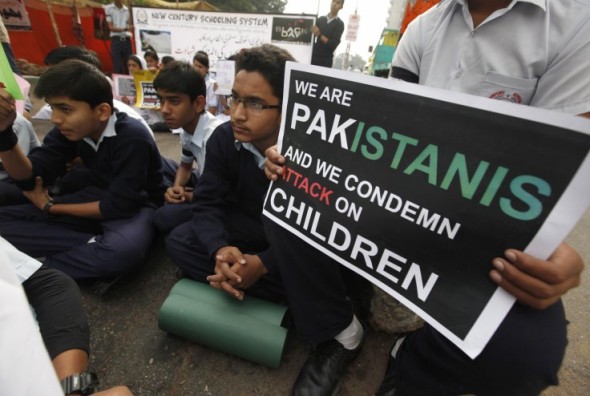The recent massacre in Peshawar which claimed the lives of 152 people, mainly school children, starkly highlights the signal failure of successive governments in definitively eliminating the Tehreek-Taliban Pakistan (TTP). The worst terrorist attack in Pakistan’s turbulent history underscores the urgent need to support an unequivocal response to an increasingly sinister menace. This not only includes robust military action but introspection and soul searching to make comprehensive changes in a society which must develop a zero tolerance stance to terrorism in all its forms and manifestations.
Orwell prize-winning journalist and author of Pakistan: a Hard Country Anatol Lieven stresses that this horrific attack does not necessarily signify gaining momentum by the TTP. On the contrary, the TTP have lost a tremendous amount of ground in recent years, having been largely pushed out of Waziristan. With TTP leaders retreating to Afghanistan, “it’s a sign of increasing desperation and revenge,” says Lieven. “It is important not to mix up terrorism with insurgency.”
The Pakistan Army had successfully wrested back control of the Swat valley from the TTP in 2007. However, ensuing political instability enabled the TTP to take possession of the valley once again in 2009 resulting in the dissipation of the hard won gains by the people of Swat and the Pakistan army.
Recalling the 2009 period where the TTP had regained their stranglehold in Swat, Lieven says that the Nizam-e-Adl agreement of February 2009 represented a watershed in Pakistan’s struggle with terrorism. This controversial act legitimised Taliban control over Swat, giving legal fiat to their draconian rule over a once peaceful and progressive valley. However, later in 2009 another full-scale military operation was launched, repulsing TTP advances.
“What is required is for all people in Pakistan is to come together, no more time to sit on the fence,” says Lieven. “It has to be a united effort,” he emphasises. “The Swat military offensive generated a wave of public support and there must be a restoration of the spirit of 2009. It is not enough to leave it to the army; the media has to launch a ruthless campaign and the government must be held accountable –it’s everybody’s problem.”
The success of the Swat operation was predicated on a unified stance against the TTP. However, since the 2009 operation there has been a lack of coordination between the military, government and media to oust the terrorist menace from Pakistan. In spite of the ground reclaimed by the Pakistan Army, the military and civilian government can no longer act at variance if a lasting peace is to be achieved.
With the branches of government historically pitted against each other in a seemingly unending power struggle, there has been a failure to adopt a sustained and cohesive strategy. The antagonistic relationship between the army, civilian government and now the judiciary has meant that undermining the army has almost become standard operating procedure, often resulting in a wholesale condemnation of the institution. In spite of the chequered history of the institution and its questionable role in politics, the government must adopt an effective strategy with the military instead of wavering between appeasement and empty calls for action. Otherwise innocents will continue to be the victims of bloody reprisals as witnessed in Peshawar.
In the wake of the Peshawar massacre, Prime Minister Nawaz Sharif’s renewed resolve to counter the scourge of terrorism in collaboration with the military through the National Action Plan Committee paves the way forward for realising peace. After, approving the execution of terrorists sentenced by military courts, the prime minister has made clear his support of the continued Zarb-i-Azab military operation to destroy militant hideouts in Waziristan and beyond. The recent elimination of a senior Taliban commander (Saddam) who is believed to have played a key role in planning the school massacre demonstrates renewed confidence in Pakistan’s security forces and government in forging a resolute approach to finally ridding the country of the terrorist scourge.
It is hoped that the democratic government and the army continue to work together to secure the future of the country rather than reverting to the all too familiar power politics which has wreaked havoc on the country for decades and has facilitated the encroachment of extremism.
In addition, Pakistan’s vibrant media must launch an unstinting campaign of condemnation against all terrorist groups. The government must heed the advice of Pakistan’s policy analysts, journalists and intelligentsia regarding dealings with Afghanistan, crafting a national narrative to counter extremist invective and building national consensus in support of a comprehensive counter-terrorism strategy.
Sadly, the TTP’s targeting of schools has been an ongoing pattern resulting in death and unimaginable trauma for Pakistan’s children. The tragic death of 17-year-old Aitezaz Hasan last year who was killed while heroically intercepting a militant attempting to bomb his school in Khyber Pakhtunkhwa is just another grim reminder of the precious lives lost.
As young Malala Yousafzai has so eloquently asserted, depriving children of education is just another cruel tactic to disseminate fear and attain control. Without education, children will be limited, disenfranchised and highly exploitable. Depriving them of education is effectively robbing them of any hope of independence, critical life skills and ensuring that they remain in a state of unremitting poverty. They will remain lambs for the slaughter, utterly dispensable. Without education, Pakistan’s youth will continue to be the subjects of abuse, violence and exploitation without redress, deepening their disenfranchisement. In his powerful book In the Name of the Rose, Umberto Eco sharply observes, “…when your true enemies are too strong, you have to choose weaker enemies…this is why the simple are so called. Only the powerful always know with great clarity who their true enemies are.”






